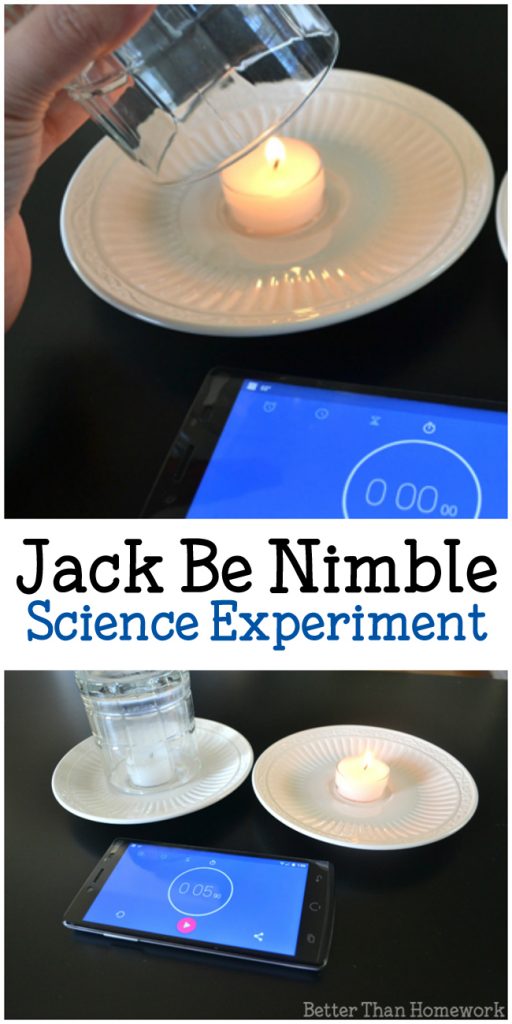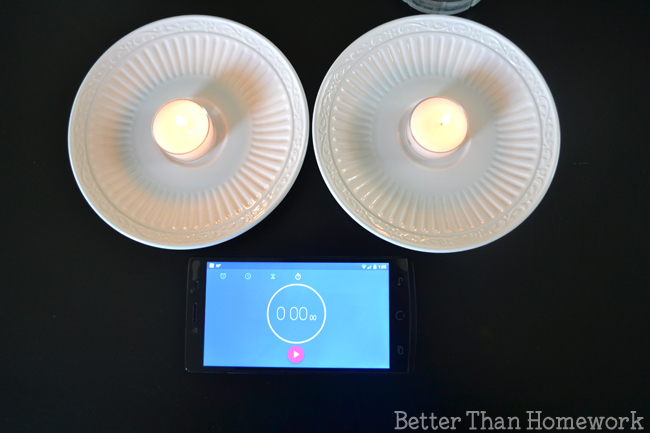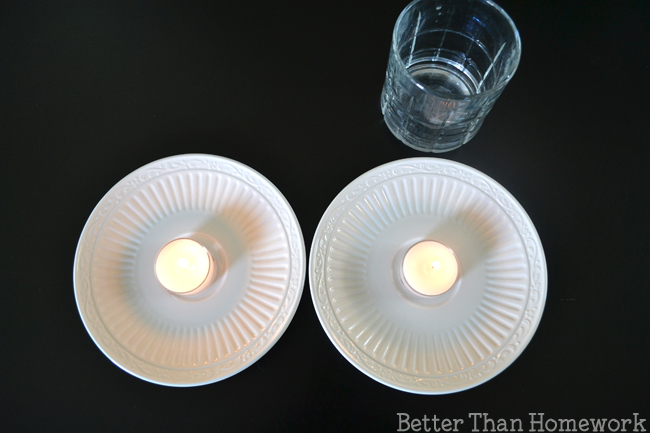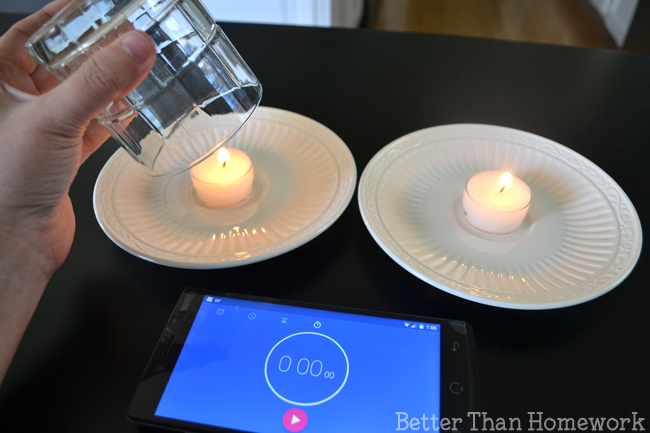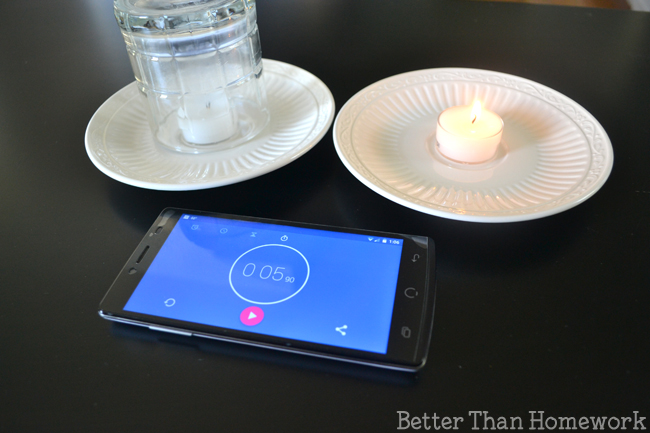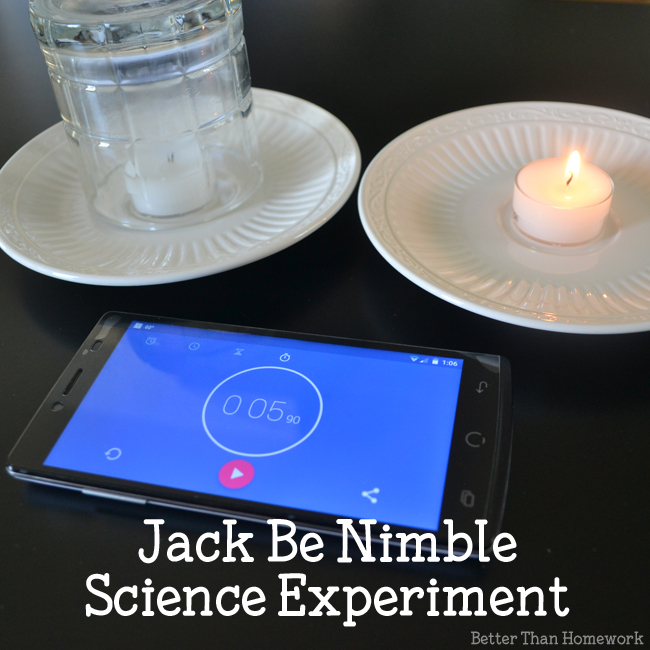I’ve always had a soft spot for nursery rhymes.
My girls grew up with them. We read tons of nursery rhyme books, did a lot of crafts, and now we’re going to do some nursery rhyme science experiments.
We experimented with candles for this Jack Be Nimble science activity. This candle science project was so much fun!
Disclosure: There are Amazon Affiliate and other affiliate links in this article which means, at no additional cost to you, we could receive compensation for our recommendations. You can read our full disclosure policy on our Disclosure Page for more details.
Table of Contents
Before You Begin
This science experiment uses fire. Please use caution and make sure there is an adult helper every step of the way.
Supplies Needed
2 candle-safe saucers or candle holders (we used the saucers from our dishes set)
Drinking glass (choose a clear glass one so you can see the candle underneath)
Timer
How to Set Up Your Jack Be Nimble Science Activity
Set a tea light on each saucer and place them side by side. Make sure there is enough room to put the glass over one of your candles.
Prepare your timer. We used the timer app on my phone.
Finally, light both of your candles.
Everything needs to be set up before you start this experiment.
Make your predictions
What will happen if you put the drinking glass over one of the candles? Which candle is going to stay lit the longest? How much longer do you think it will be?
Take the time to discuss with your kids about what they think will happen during this experiment.
Do the Experiment
This experiment moves fast, so be ready!
Place your drinking glass over one of your lit candles. Start your timer as soon as you set your glass over the candle.
Hint: It works best if to have one person in charge of the glass and one person in charge of the timer. If you’re working with a child too young to work with the candle, put them in charge of starting the timer!
Keep a watch on the candles. As soon as one candle goes out, stop the timer.
Which candle stopped burning first? How long did it take to go out?
The science behind this experiment
Fire needs two things to burn: oxygen and fuel. If you take one of these away, your fire will burn out. When we placed the drinking glass over our candle, we reduced the amount of oxygen. It didn’t take long for our fire to use up that bit of oxygen. Our candle burned out in under six seconds! Our second candle had a constant supply of oxygen, so it stayed lit until we blew it out.
What was the result of your experiment? How long did your candle underneath the glass stay lit?
Experiment More
If you want to experiment further, find a second drinking glass that is a different size than the first one. Set up your experiment again and this time put a glass over each of the candles. Which of these candles burnt out first? Why do you think that happened?
You may also like one of these science experiments:
Making Butter – Little House Inspired Science
Fun Kitchen Science Experiments
Chemical Reactions with Pennies
Humpty Dumpty Science Experiments at Science Sparks
My Must-Have Resources for Science Fun
I don’t know about you, but I don’t always have time to prep a fun science project. That’s why I love Green Kid Crafts Discovery boxes. The boxes are packed full of projects that are fun and inviting. You can choose to get a subscription or a one-off box based off of a specific theme. Any one you choose would be a lot of fun!
Here are some of our favorites (you can purchase and find out more at each link):
Find all their fun STEM and science boxes here.
STEAM Family Activities
Wouldn’t it be so much fun to get STEAM family activities delivered to your inbox? I think so! That’s why I’ve created this fun series, STEAM Family Fun, to be delivered to your inbox. After going through all the letters in STEAM each week with a fun activity devoted to each, you’ll start receiving a fun STEAM activity once a month. (And I’ll also pop up in your inbox occasionally if I’ve got other fun things to share.)
Fill out the form below to start receiving STEAM Family Fun in your inbox.
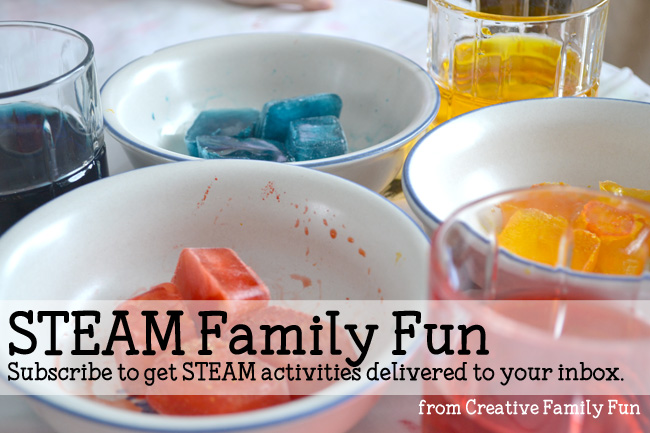
Latest posts by Terri Thompson (see all)
- Cardboard Tube Turkey Craft - October 30, 2023
- Simple and Fun Shape Crafts for Toddlers - October 25, 2023
- Thanksgiving Math Activities for Kids - November 10, 2022
